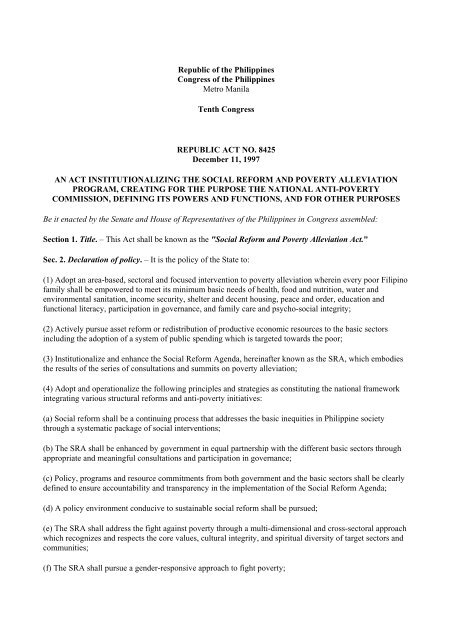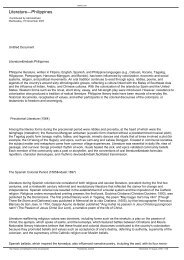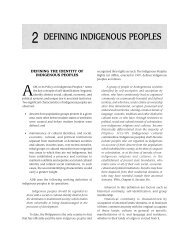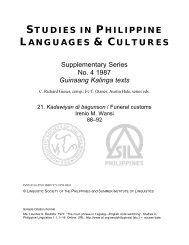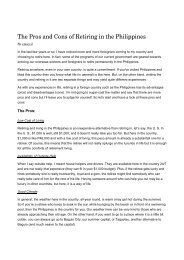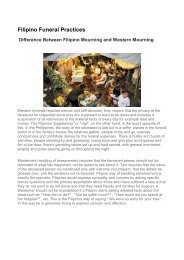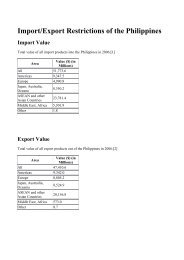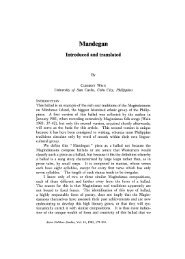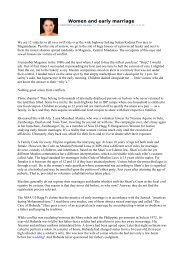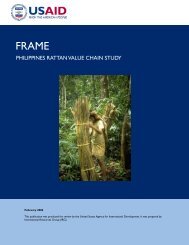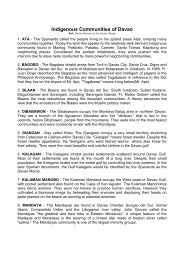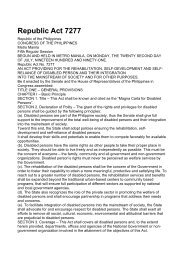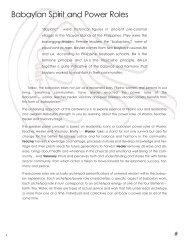RA 8425 - Philippine Culture
RA 8425 - Philippine Culture
RA 8425 - Philippine Culture
- No tags were found...
Create successful ePaper yourself
Turn your PDF publications into a flip-book with our unique Google optimized e-Paper software.
(g) The S<strong>RA</strong> shall promote ecological balance in the different ecosystems, in a way that gives the basicsectors a major stake in the use, management, conservation and protection of productive resources;(h) The S<strong>RA</strong> shall take into account the principle and interrelationship of population and development in theplanning and implementation of social reform programs thereby promoting self-help and self-reliance; and(i) The S<strong>RA</strong> implementation shall be focused on specific target areas and basic sectors.Section 3. Definition of terms. – As used in this Act, the following terms shall mean:(a) "Artisanal fisherfolk" – Refers to municipal, small scale or subsistence fishermen who use fishing gearwhich do not require boats or which only require boats below three (3) tons;(b) "Basic sectors" – Refer to the disadvantaged sectors of <strong>Philippine</strong> society, namely: farmer-peasant,artisanal fisherfolk, workers in the formal sector and migrant workers, workers in the informal sector,indigenous peoples and cultural communities, women, differently-abled persons, senior citizens, victims ofcalamities and disasters, youth and students, children, and urban poor;(c) "Cooperative" – Refers to a duly registered association of at least fifteen (15) persons, majority of whichare poor, having a common bond of interest, who voluntarily join together to achieve a lawful commonsocial and economic end. It is organized by the members who equitably contribute the required share capitaland accept a fair share of the risks and benefits of their undertaking in accordance with the universallyaccepted corporate principles and practices;(d) "Capability building" – Refers to the process of enhancing the viability and sustainability of microfinanceinstitutions through activities that include training in microfinance technologies, upgrading of accounting andauditing systems, technical assistance for the installation or improvement of management informationsystems, monitoring of loans and other related activities. The term capability building shall in no way refer tothe provision of equity investments, seed funding, partnership's seed funds, equity participation, start-upfunds or any such activity that connotes the infusion of capital or funds from the government or from thepeople's development trust fund to microfinance institution as defined in this Act. Capability buildingprecludes the grant of any loan or equity funds to the microfinance institution;(e) "Collateral-free arrangement" – A financial arrangement wherein a loan is contracted by the debtorwithout the conventional loan security of a real estate or chattel mortgage in favor of the creditor. In lieu ofthese conventional securities, alternative arrangements to secure the loans and ensure repayment are offeredand accepted;(f) "Group character loan" – A loan contracted by a member and guaranteed by a group of persons for itsrepayment. The creditor can collect from any of the members of the group which guaranteed the said loan,without prejudice to the right of reimbursement of the member or members of the group who had advancedthe payment in favor of the actual debtor;(g) "Indigenous cultural communities/ indigenous peoples" – As defined in Republic Act No. 8371,otherwise known as "The Indigenous Peoples Rights Act of 1997";(h) "Migrant workers" – As defined in Republic Act No. 8042, otherwise known as the "Migrant Workersand Overseas Filipino Act of 1995";
(i) "Micro-enterprise" – Any economic enterprise with a capital of One hundred fifty thousand pesos(P150,000.00) and below. This amount is subject to periodic determination of the Department of Trade andIndustry to reflect economic changes;(j) "Microfinance" – A credit and savings mobilization program exclusively for the poor to improve the assetbase of households and expand the access to savings of the poor. It involves the use of viable alternativecredit schemes and savings programs including the extension of small loans, simplified loan applicationprocedures, group character loans, collateral-free arrangements, alternative loan repayments, minimumrequirements for savings, and small denominated savers' instruments;(k) "Minimum basic needs" – Refers to the needs of a Filipino family pertaining to survival (food andnutrition; health; water and sanitation; clothing), security (shelter; peace and order; public safety; income andlivelihood) and enabling (basic education and literacy; participation in community development; family andpsycho-social care);(l) "Human development index" – Refers to the measure of how well a country has performed, based onsocial indicators of people's ability to lead a long and healthy life, to acquire knowledge and skills, and tohave access to the resources needed to afford a decent standard of living. This index looks at a minimum ofthree outcomes of development: the state of health (measured by life expectancy at birth), the level ofknowledge and skill (measured by a weighted average of adult literacy and enrollment rates), and the level ofreal income per capita, adjusted for poverty considerations;(m) "Non-government organizations" – Refers to duly registered non-stock, non-profit organizationsfocusing on the upliftment of the basic or disadvantaged sectors of society by providing advocacy, training,community organizing, research, access to resources, and other similar activities;(n) "People's organization" – Refers to a self-help group belonging to the basic sectors and/or disadvantagedgroups composed of members having a common bond of interest who voluntarily join together to achieve alawful common social or economic end;(o) "Poor" – Refers to individuals and families whose income fall below the poverty threshold as defined bythe National Economic and Development Authority and/or cannot afford in a sustained manner to providetheir minimum basic needs of food, health, education, housing and other essential amenities of life;(p) "Poverty alleviation" – Refers to the reduction of absolute poverty and relative poverty;(q) "Absolute poverty" – Refers to the condition of the household below the food threshold level;(r) "Relative poverty" – Refers to the gap between the rich and the poor;(s) "Social reform" – Refers to the continuing process of addressing the basic inequities in Filipino societythrough a systematic, unified and coordinated delivery of socioeconomic programs or packages;(t) "Small Savers Instrument (SSI)" – Refers to an evidence of indebtedness of the Government of theRepublic of the <strong>Philippine</strong>s which shall be in small denominations and sold at a discount from its redemptionvalue, payable to bearer and redeemable on demand according to a schedule printed on the instrument, with adiscount lower than the full stated rate if not held to maturity. The resources generated under this schemeshall be used primarily for micro-credit for the poor. SSIs are not eligible as legal reserve of banks and legalreserves prescribed of insurance companies operating in the <strong>Philippine</strong>s;
(6) For members of other disadvantaged groups such as the women, children, youth, persons withdisabilities, the elderly, and victims of natural and man-made calamities – the Comprehensive IntegratedDelivery of Social Services (CIDSS).Additionally, to support the sectoral flagship programs, the following cross-sectoral flagships shall likewisebe instituted:(1) Institution-building and effective participation in governance;(2) Livelihood programs;(3) Expansion of micro-credit/microfinance services and capability building; and(4) Infrastructure buildup and development.TITLE INATIONAL ANTI-POVERTY COMMISSIONSec. 5. The National Anti-Poverty Commission. – To support the above-stated policy, the National Anti-Poverty Commission, hereinafter referred to as the NAPC, is hereby created under the Office of thePresident, which shall serve as the coordinating and advisory body for the implementation of the S<strong>RA</strong>. ThePresidential Commission to Fight Poverty (PCFP), the Social Reform Council (SRC), and the PresidentialCouncil for Countryside Development (PCCD) are hereby abolished and the NAPC shall exercise the powersand functions of these agencies. The NAPC shall be the successor-in-interest of the three (3) abolishedcommissions and councils.The creation and operationalization of the NAPC shall be guided by the following principles:(1) Incorporation of the Social Reform Agenda into the formulation of development plans at the national,regional, sub-regional and local levels;(2) Efficiency in the implementation of the anti-poverty programs by strengthening and/or streamliningpresent poverty alleviation processes and mechanisms, and reducing the duplication of functions andactivities among various government agencies;(3) Coordination and synchronization of social reform and poverty alleviation programs of nationalgovernment agencies;(4) Exercise of policy oversight responsibilities to ensure the attainment of social reform and povertyalleviation goals;(5) Strengthening of local government units to more effectively operationalize the S<strong>RA</strong> in local developmentefforts;(6) Institutionalization of basic sectoral and NGO participation in effective planning, decision-making,implementation, monitoring and evaluation of the S<strong>RA</strong> at all levels;(7) Ensuring adequate, efficient and prompt delivery of basic services to the poor; and(8) Enjoining government financial institutions to open credit and savings windows for the poor, andadvocating the creation of such windows for the poor among private banking institutions.
Sec. 6. Composition of the NAPC. – The President of the Republic of the <strong>Philippine</strong>s shall serve asChairperson of the NAPC. The President shall appoint the Lead Convenor of the NAPC, either from thegovernment or private sector, who shall likewise serve as the head of the National Anti-Poverty CommissionSecretariat, and shall have the rank of a Cabinet Secretary. There shall be a vice-chairperson for thegovernment sector and a vice-chairperson for the basic sectors; the former to be designated by the President,and the latter to be elected among the basic sector representatives of the NAPC as vice-chairperson for thebasic sector; and the following as members:(1) Heads of the following government bodies:(a) Department of Agrarian Reform (DAR);(b) Department of Agriculture (DA);(c) Department of Labor and Employment (DOLE);(d) Department of Budget and Management (DBM);(e) Department of Social Welfare and Development (DSWD);(f) Department of Health (DOH);(g) Department of Education, <strong>Culture</strong> and Sports (DECS);(h) Department of the Interior and Local Government (DILG);(i) Department of Environment and Natural Resources (DENR);(j) Department of Finance (DOF);(k) National Economic and Development Authority (NEDA);(l) People's Credit and Finance Corporation (PCFC), subject to Sec. 17 of this Act; and(m) Presidential Commission on Urban Poor (PCUP).(2) Presidents of the Leagues of Local Government Units:(a) League of Provinces;(b) League of Cities;(c) League of Municipalities;(d) Liga ng mga Barangay.(3) Representatives from each of the following basic sectors:(a) Farmers and landless rural workers;
(b) Artisanal fisherfolk;(c) Urban poor;(d) Indigenous cultural communities/indigenous peoples;(e) Workers in the formal sector and migrant workers;(f) Workers in the informal sector;(g) Women;(h) Youth and students;(i) Persons with disabilities;(j) Victims of disasters and calamities;(k) Senior citizens;(l) Nongovernment organizations (NGOs);(m) Children; and(n) Cooperatives.Sectoral councils formed by and among the members of each sector shall respectively nominate three (3)nominees from each sector within six (6) months after the effectivity of the implementing rules andregulations of this Act, and every three (3) years thereafter and in case of vacancy. The President of theRepublic of the <strong>Philippine</strong>s shall, within (30) days after the submission of the list of nominees, appoint therepresentatives from the submitted list. Sectoral representatives shall serve for a term of three (3) yearswithout reappointment. Appointment to any vacancy for basic sector representatives shall be only for theunexpired term of the predecessor.The implementing rules and regulations (IRR) of this Act shall contain the guidelines for the formation ofsectoral councils, the nomination process, recall procedures and such other mechanisms to ensureaccountability of the sectoral representatives.Sec. 7. Powers and functions. – The NAPC shall exercise the following powers and functions:(1) Coordinate with different national and local government agencies and the private sector to assure fullimplementation of all social reform and poverty alleviation programs;(2) Coordinate with local government units in the formulation of social reform and poverty alleviationprograms for their respective areas in conformity with the National Anti-Poverty Action Agenda;(3) Recommend policy and other measures to ensure the responsive implementation of the commitmentsunder the S<strong>RA</strong>;(4) Ensure meaningful representation and active participation of the basic sectors;
(5) Oversee, monitor and recommend measures to ensure the effective formulation, implementation andevaluation of policies, programs and resource allocation and management of social reform and povertyalleviation programs;(6) Advocate for the mobilization of funds by the national and local governments to finance social reformand poverty alleviation programs and capability building activities of people's organizations;(7) Provide financial and non-financial incentives to local government units with counterpart resources forthe implementation of social reform and poverty alleviation programs; and(8) Submit an annual report to Congress including, but not limited to, all aspects of its operations andprograms and project implementation, financial status and other relevant data as reflected by the basic reformindicator.Sec. 8. Principal office. – The NAPC shall establish its principal office in Metro Manila and may establishsuch branches within the <strong>Philippine</strong>s as may be deemed necessary by the President of the <strong>Philippine</strong>s to carryout the powers and functions of the NAPC.Section 9. The NAPC secretariat. – The NAPC shall be supported by a Secretariat, which shall be headed bythe Lead Convenor referred to under Sec. 6 hereof. The Secretariat shall provide technical and administrativesupport to the NAPC. It shall be formed from the unification of the secretariats of the following bodies:(1) Presidential Commission to Fight Poverty (PCFP);(2) Social Reform Council (SRC); and(3) Presidential Council for Countryside Development (PCCD).Within three (3) months from the effectivity of this Act, the Office of the President shall finalize theorganizational plan for the NAPC.To provide the continuity of existing social reform and poverty alleviation related programs, all accreditedorganizations under the three (3) unified councils and commissions shall be automatically accredited underthe NAPC until such time that additional accreditation requirements may be provided by the NAPC.Sec. 10. The People's Development Trust Fund. – The People's Development Trust Fund (PDTF) is herebyestablished, which shall be monitored by the NAPC.The Trust Fund in the amount of Four billion and five hundred million pesos (P4,500,000,000.00) shall befunded from the earnings of the PAGCOR in addition to appropriations by Congress, voluntarycontributions, grants, gifts from both local and foreign sources as may be accepted or decided on by theNAPC. Any additional amount to the Trust Fund shall form part of the corpus of the Trust Fund, unless thedonor, contributor or grantor expressly provides as a condition that the amount be included in the disbursibleportion of the Trust Fund.The President of the <strong>Philippine</strong>s shall assign to any existing government department or agency theadministration of the Trust Fund, based on the expertise, organizational capability, and orientation or focusof the department or agency. The NAPC shall be limited to the function of monitoring the utilization of thePDTF, while the government departments or agencies designated by the President shall directly administerthe utilization of the earnings of the PDTF.
Only the fruits of the PDTF shall be used for the purposes provided in this Act. Any undisbursed fruits forthe preceding year shall form part of the disbursible portion of the PDTF in the following year.For the purpose of monitoring the earnings of the PDTF, the NAPC shall:(1) Source funds for the establishment of and augmentation to the Trust Fund;(2) Recommend to the appropriate government department or agency the accreditation of organizations andinstitutions that shall act as resource partners in conducting institutional development and capability buildingactivities for accredited organizations and beneficiaries of microfinance and micro-enterprise programs;(3) Ensure that validation and monitoring activities are conducted for funded institutional development andcapability building projects/programs/beneficiaries; and(4) Promote research and development work on livelihood and microfinance technology andpublications/communications programs that assist the poor beneficiaries.Sec. 11. Purposes of the People's Development Trust Fund (PDTF). – The earnings of the PDTF shall beutilized for the following purposes:(1) Consultancy and training services for microfinance institutions and their beneficiaries on theestablishment of the necessary support services, social and financial preparation of beneficiaries, preparationof plans and programs including fund sourcing and assistance, establishment of credit and savingsmonitoring and evaluation mechanisms;(2) Scholarships or training grants for microfinance staff and officers, and selected beneficiaries;(3) Community organizing for microfinance, livelihood and micro-enterprises training services;(4) Livelihood/micro-enterprise project/program feasibility studies and researches;(5) Savings mobilization and incentive programs, and other similar facilities;(6) Information and communication systems such as baseline surveys, development monitoring systems,socioeconomic mapping surveys, organizational assessments, and other similar activities;(7) Legal and other management support services such as registration, documentation, contract review andenforcement, financial audit and operational assessment;(8) Information dissemination of microfinance technology; and(9) Other activities to support microfinance as approved by the designated agency administering the PDTF.The PDTF may be accessed by the following:(a) Registered microfinance organizations engaged in providing micro-enterprise services for the poor toenable them to become viable and sustainable;(b) Local government units providing microfinance and micro-enterprise programs to their constituents:Provided, That the PDTF shall not be used by the LGUs for personal services and maintenance and otheroperating expenses; and
(c) Local government units undertaking self-help projects where at least twenty-five percent (25%) of thetotal earnings of the PDTF shall be used exclusively for the provision of materials and technical services.Sec. 12. The role of Local Government Units (LGUs). – The local government units, through the localdevelopment councils of the province, city, municipality, or barangay shall be responsible for theformulation, implementation, monitoring and evaluation of the National Anti-Poverty Action Agenda in theirrespective jurisdictions. The LGUs shall:(a) Identify the poor in their respective areas based on indicators such as the minimum basic needs approachand the human development index, their location, occupation, nature of employment, and their primaryresource base and formulate a provincial/city/municipality anti-poverty action agenda;(b) Identify and source funding for specific social reform and poverty alleviation projects;(c) Coordinate, monitor and evaluate the efforts of local government units with the private sector on planningand implementation of the local action program for social reform and poverty alleviation; and(d) Coordinate and submit progress reports to the National Anti-Poverty Commission regarding their localaction programs.Nothing in this Act shall be construed as diminishing the powers granted to the local government units underthe Local Government Code.TITLE IIMICROFINANCE SERVICES FOR THE POORSec. 13. Microfinance program. – The programs and implementing mechanisms of the Social ReformAgenda's Flagship Program on Credit shall be integrated, adopted and further enhanced to effectively supportthe objectives of this Act along the following thrusts:(1) Development of a policy environment, especially in the area of savings generation, supportive of basicsector initiatives dedicated to serving the needs of the poor in terms of microfinance services;(2) Rationalization of existing government programs for credit and guarantee;(3) Utilization of existing government financial entities for the provision of microfinance products andservices for the poor; and(4) Promotion of mechanisms necessary for the implementation of microfinance services, includingindigenous microfinance practices.Sec. 14. People's Credit and Finance Corporation (PCFC). – The People's Credit and Finance Corporation(PCFC), a government- controlled corporation registered with the Securities and Exchange Commission andcreated in accordance with Administrative Order No. 148 and Memorandum Order No. 261, shall be thevehicle for the delivery of microfinance services for the exclusive use of the poor. As a government-ownedand -controlled corporation, it shall be the lead government entity specifically tasked to mobilize financialresources from both local and international funding sources for microfinance services for the exclusive use ofthe poor.
Sec. 15. Increase in the Capitalization of PCFC. – To facilitate the increase in the capitalization of thePCFC, the President of the Republic of the <strong>Philippine</strong>s shall take measures to enable the amendment of theArticles of Incorporation of the PCFC such that:(a) The authorized capital stock of the PCFC may be increased from One hundred million pesos(P100,000,000.00) to Two billion pesos (P2,000,000,000.00) divided into twenty million common shareswith a par value of One hundred pesos (P100.00) per share;(b) The subscribed capital stock may be increased from One hundred million pesos (P100,000,000.00) to Sixhundred million pesos (P600,000,000.00) and the national government may subscribe the difference of Fivehundred million pesos (P500,000,000.00);(c) The initial paid-up capital may be increased from One hundred million pesos (P100,000,000.00) to Twohundred fifty million pesos (P250,000,000.00), to be increased subsequently to a total of Six hundred millionpesos (P600,000,000.00), such that at the end of a period of four (4) years the subscribed capital shall befully paid-up, in the following manner:For the initial increase in paid-up capital during the first year, the difference of One hundred fifty millionpesos (P150,000,000.00) shall be paid and appropriated for by government; for the second year, One hundredfifty million pesos (P150,000,000.00); for the third year, One hundred million pesos (P100,000,000.00); andfor the fourth year, One hundred million pesos (P100,000,000.00).The appropriations for the additional paid-up capital shall be sourced from the share of the nationalgovernment in the earnings of the PAGCOR, in the manner provided for under Sec. 18, which provides forthe appropriations under this Act.Sec. 16. Special credit windows in existing Government Financing Institutions (GFIs). – The existinggovernment financial institutions shall provide for the savings and credit needs of the poor. The GFIs such asthe Land Bank of the <strong>Philippine</strong>s, <strong>Philippine</strong> Postal Bank, Al Amanah Bank, and the Development Bank ofthe <strong>Philippine</strong>s are hereby mandated to coordinate with NAPC and PCFC in setting up special creditwindows and other arrangements, such as the servicing of Small Savers Instruments (SSIs), that will promotethe microfinance program of this Act.The private financing institutions may also provide the savings and credit requirements of the poor by settingup similar credit windows and other arrangements to promote the savings component of the microfinanceprogram of this Act.Special credit windows for the poor shall, as far as practicable, include an allocation for the basic sectors, asdefined in this Act, particularly those living in the rural areas, agrarian reform communities, and women inthe countryside.Sec. 17. PCFC privatization. – In the event that the ownership of the majority of the issued voting stocks ofPCFC shall have passed to private investors (exclusively qualified nongovernment organizations, people'sorganizations and cooperatives), the stockholders shall cause the registration with the Securities andExchange Commission (SEC) of the revised Articles of Incorporation and By-laws. The PCFC shallthereafter be considered as a privately organized entity subject to the laws and regulations generally appliedto private corporations.The chairman of the PCFC may still be a member of the National Anti-Poverty Commission (NAPC) uponthe privatization of the PCFC: Provided, That the PCFC will continue its main purpose of providing for thesavings and credit needs of the poor.
TITLE IIIAPPROPRIATIONS FOR THE NATIONAL ANTI-POVERTY COMMISSION (NAPC) AND THEPEOPLE'S DEVELOPMENT TRUST FUND (PDTF)Sec. 18. Appropriations. – To carry out the provisions of this Act, the following amounts are appropriated asfollows:(1) The sum of One hundred million pesos (P100,000,000.00) is hereby appropriated as the initial operatingfund in addition to the unutilized funds of the rationalized commission and councils. The sum shall besourced from the President's Contingent Fund. In subsequent years, the amount necessary to implement thisAct shall be included in the annual appropriations. The said amounts shall be under the management of theNAPC.(2) The aggregate sum of Four billion and five hundred million pesos (P4,500,000,000.00) for ten (10) yearsis hereby appropriated for the establishment of the People's Development Trust Fund (PDTF) from the shareof the national government in the earnings of the <strong>Philippine</strong> Amusement and Gaming Corporation(PAGCOR), in the following manner: on the first year, Three hundred fifty million pesos (P350,000,000.00);on the second year, Three hundred fifty million pesos (P350,000,000.00); on the third year, Four hundredmillion pesos (P400,000,000.00); on the fourth year, Four hundred million pesos (P400,000,000.00); on thefifth year and every year thereafter until the tenth year, Five hundred million pesos (P500,000,000.00)annually.(3) The aggregate sum of Five hundred million pesos (P500,000,000) for four years shall be appropriated forthe increase in the capitalization of the PCFC, from the share of the national government in the earnings ofthe PAGCOR, at such time that the increase in the capitalization of the PCFC, in the manner provided forunder Sec. 15 of this Act, shall have been effected. The appropriation shall be made in the following manner:on the first year, One hundred fifty million pesos (P150,000,000.00); on the second year, One hundred fiftymillion pesos (P150,000,000.00); on the third year, One hundred million pesos (P100,000,000.00); and onthe fourth year, One hundred million pesos (P100,000,000.00).Sec. 19. Transitory provision. – The Social Reform Council (SRC) and the representatives therein shall, intemporary capacity, exercise the powers and assume the duties of the NAPC until such time that themembers of NAPC shall have been duly appointed or designated.The Office of the President shall formulate the implementing rules and regulations (IRR) of this Act withinsix (6) months after its effectivity.The assets, liabilities and personnel of PCFP, SRC and PCCD are hereby transferred to the NAPC. Personnelwho cannot be absorbed by NAPC shall be entitled to a separation pay of one-and-a-half (1 1/2) months forevery year of service and other benefits under existing retirement laws, at the option of the personnelconcerned.Sec. 20. Repealing clause. – All laws, executive orders, rules and regulations, or parts thereof, inconsistentwith this Act are hereby repealed, amended or modified accordingly. The provisions of this Act shall not berepealed, amended or modified unless expressly provided in subsequent general or special laws.Sec. 21. Separability clause. – If any provision of this Act shall be held invalid or unconstitutional, theremaining provisions thereof not affected thereby shall remain in full force and effect.Sec. 22. Effectivity clause. – This Act shall be effective on June 30, 1998. Approved: December 11,1997


